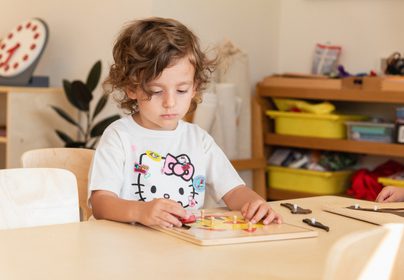It’s the World Kindness Day!
The Montessori method is celebrated for its child-centered approach that emphasizes independence, respect, and holistic development. A lesser-known, yet crucial, aspect of the Montessori philosophy is how it fosters kindness and empathy in children. By creating an environment that nurtures empathy from an early age, Montessori education encourages kids to grow into compassionate adults who view kindness as a fundamental part of their identity. Let’s delve into how Montessori principles plant seeds of empathy and social responsibility in children.
One of the core principles of Montessori education is offering children freedom within boundaries. In a Montessori classroom, children are free to choose their activities and move about, but they are also expected to respect their peers and the environment. This balance between autonomy and responsibility helps children learn that their actions affect others and teaches them to respect the space and needs of those around them.
Through guided choices, children learn self-discipline and accountability, which are foundational to empathy. When they see the positive outcomes of respecting boundaries and supporting others, kindness becomes a natural byproduct of their behaviour.
In Montessori classrooms, children of different ages learn together, which creates a unique social dynamic. Younger children naturally look up to older classmates, who, in turn, take on leadership roles by modeling behaviors, helping, and guiding the younger ones. This structure encourages mentorship, as older students learn to be patient and compassionate in assisting their peers.
Watching kindness in action and experiencing it directly from peers teaches children the value of empathy. Through these everyday interactions, children internalize social and emotional skills that make kindness second nature.
Montessori educators integrate “grace and courtesy” lessons into the curriculum, teaching children specific ways to show respect and empathy toward others. These lessons might include showing how to offer help, sharing, speaking softly, making eye contact, and expressing gratitude. By practicing these behaviors, children learn the subtle ways kindness can be conveyed.
These lessons also extend to resolving conflicts. Montessori teachers guide children in communicating their feelings, listening to others, and finding mutually respectful solutions. This equips children with tools to manage their emotions and understand others’ perspectives, critical steps in developing empathy.
Montessori classrooms often have an emphasis on connecting children with nature through activities like gardening, caring for plants, and caring for classroom animals. These responsibilities teach children that their actions directly impact the well-being of other living things, which cultivates a sense of stewardship and compassion. By engaging with nature, children develop an early sense of responsibility to care for others, an instinct that can transfer to their interactions with people.
These activities reinforce the idea that kindness is not limited to human interactions; it’s about respecting all forms of life and understanding that we’re all interconnected.
In Montessori education, children are encouraged to be as independent as possible, engaging in activities that boost their confidence and self-worth. This autonomy teaches children to trust their abilities, fostering a strong sense of self that is critical for developing empathy. Research suggests that children who feel capable and valued are more likely to treat others with compassion and respect.
When children feel confident in themselves, they become better equipped to support others, share resources, and show kindness without feeling diminished. This empowered self-identity is key to empathetic and balanced relationships as adults.
Montessori classrooms celebrate diversity and individual learning paces. The philosophy respects each child’s unique strengths and needs, creating an environment where differences are valued. This inclusivity teaches children to see everyone as worthy of respect and kindness, reinforcing empathy toward people from various backgrounds and abilities.
By interacting with a diverse group of peers, children become more accepting and understanding of different perspectives, a crucial skill for empathetic engagement in adulthood.
Long-Term Impact: How Montessori’s Empathy Lessons Shape Adulthood
Montessori-educated children grow up with a foundation in kindness, respect, and empathy, which translates into their adult lives. Many Montessori graduates report feeling equipped to understand and value others’ perspectives, navigate conflicts respectfully, and contribute positively to their communities. This “Montessori effect” nurtures adults who are not only self-assured and capable but also empathetic and kind-hearted.
By integrating kindness, empathy, and respect into its core principles, the Montessori method ensures that these values become intrinsic in children’s character. The result is a generation of adults who lead with kindness, advocate for inclusivity, and view empathy as essential to their interactions with others. In a world that increasingly values emotional intelligence, Montessori education is a pathway to nurturing not only educated minds but also compassionate hearts.




